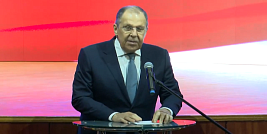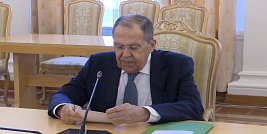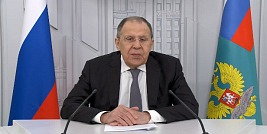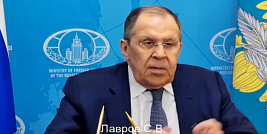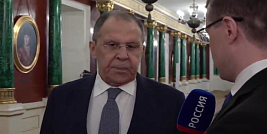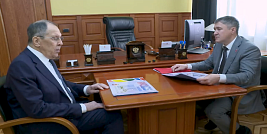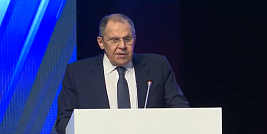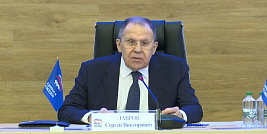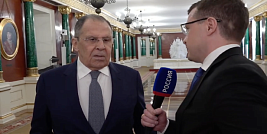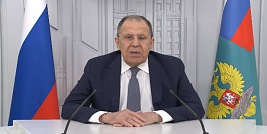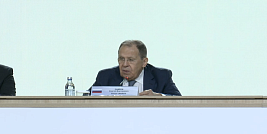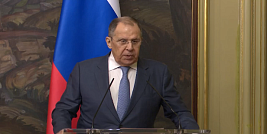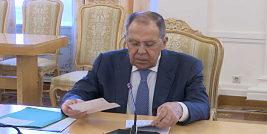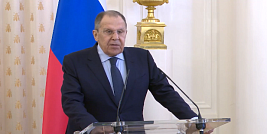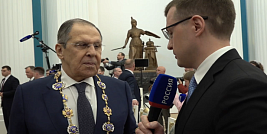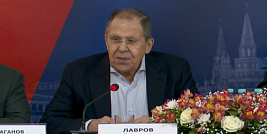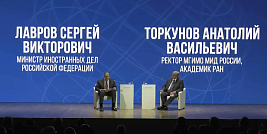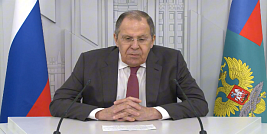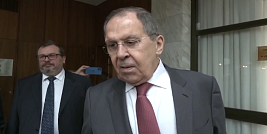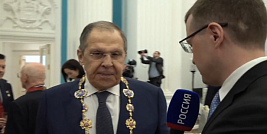Foreign Minister Sergey Lavrov’s remarks and answers to media questions during a joint press conference with Minister of External Affairs of India Subrahmanyam Jaishankar, Moscow, December 27, 2023
Ladies and gentlemen,
We have held talks at the foreign minister level as part of the visit to the Russian Federation of my colleague and friend, Foreign Minister of the Republic of India, Subrahmanyam Jaishankar.
Yesterday, his Excellency, Mr Minister, had detailed talks as co-chair of the Russia-India Intergovernmental Commission for Trade, Economic, Scientific, Technical and Cultural Cooperation with the Russian co-chair, Deputy Prime Minister Denis Manturov.
Today, we noted the positive outcome of these talks consisting of concrete agreements on ways to further deepen our trade, economic and investment ties, as well as relations in other spheres within the Intergovernmental Commission’s purview.
Yesterday’s talks and our meeting today reaffirmed the trust-based nature of
We spoke in favour of maintaining proactive political dialogue for steadily strengthening our bilateral relations. We paid special attention to stepping up our practical cooperation in addition to the agreements reached yesterday within the Intergovernmental Commission. Today, we agreed on several steps which are expected to enable us to expand our cooperation, including as we prepare to launch the International North-South Transport Corridor, create the Chennai-Vladivostok route and work together to develop the Northern Sea Route, which is a promising avenue for cooperation.
We agreed on the need to expand the contractual legal framework for bilateral relations, including by accelerating efforts to sign an agreement on protecting mutual investment. There is another important multilateral document on the agenda – the agreement creating a Free Trade Area between
We discussed prospects for military-technical cooperation, including joint production of modern weapons. We made progress in this area as well. Our interaction is strategic in this respect. Strengthening this cooperation meets the national interests of our states and helps maintain security in
We confirmed our desire to intensify cooperation in energy. This is also a strategic area in our cooperation. I am referring to the buildup of hydrocarbon exports from
We positively assessed our bilateral cooperation on manned space programmes, rocket engine manufacturing and satellite navigation systems.
We spoke at length about regional and international affairs. We focused on our interaction at multilateral venues, primarily the UN, where
We are sincerely grateful to our Indian colleagues for their striving to adopt a responsible approach to discussing and resolving regional and global problems in line with the principles of equitable and fair international cooperation. This approach is typical of
Today, we also reviewed other regional issues. This applies, in part, to the situation in the Asia-Pacific Region in the context of the processes that are developing there, probably, even contrary to ASEAN’s earlier agreements.
We discussed the situation in
I am grateful to my colleague and friend for these talks.
Question: Presidential Aide Maxim Oreshkin said the Global North economies were becoming increasingly unstable while the economies of the east and the south were picking up pace. The North-South corridor is a most promising project that will expand transport links with the growing economies. Considering the mounting Western pressure, including the sanctions, can we expect this project to get a second wind?
Sergey Lavrov: Mr Oreshkin laid out his assessments based on statistical data which are abundantly available. They convincingly reveal the trend for regrouping the forces in the global economy and in finance. This process is leading to a steady increase in the share of the economies of the Global East and Global South and indicates a decline in the role of the Global North, which we are accustomed to associating with the G7 and their closest allies. This is objective statistical data.
The trend will become more entrenched in connection with the expansion of BRICS, among other things. Following the accession of new members, the aggregate GDP of the BRICS countries will significantly exceed the GDP of the G7 countries. This process of the natural evolution of the global economy is also connected with numerous mistakes and unacceptable methods that the United States and its allies are using to hold back the objective course of history.
Today, we mentioned the fact that our positions overlap. We are against the distortion of the principles of international law, free markets, and fair competition, and we find the violations of the tenets underlying globalisation that the West has promoted for so long, unacceptable. It did not hesitate to part ways with them, and began to abuse the position of its reserve currencies and other mechanisms which were created under the banner of serving all of humanity. Of course, the West has lost much of its credibility. It now makes more sense to rely on the role of the Global Majority when it comes to advancing the global economy not to the detriment of one group, but for everyone’s benefit.
In addition to the Chennai-Vladivostok and the Northern Sea Route, we discussed the North-South transport corridor. It does not need a second wind. It has it already. The project has created much enthusiasm among the stakeholder countries. The project will soon be completed.
Question (retranslated from English): India talks like an equal partner with everyone, the golden billion countries and the Global South, as we could see in New Delhi's communiqué issued at the close of the G20 summit. How important is this policy for Russia?
Sergey Lavrov: I believe this policy is not just important for Russia and all other countries around the world, but it is the only policy worth conducting that will ensure respect and reputation and be beneficial in India’s cooperation with other countries that show similar respect to all members of the international community. This policy embodies the central provision of the UN Charter, which is (as written in that document) about respect for the sovereign equality of states.
India is a vivid example of how this principle translates into real life. Russia is also pursuing a policy that is free of any attempts to punish anyone or act in a biased manner with regard to any country. This is not what our principles and manners are all about. We see examples from another group of countries, including, as was earlier said, the golden billion countries.
You mentioned the G20 summit in New Delhi which took place this autumn. It was truly a triumph of India’s foreign policy and multilateral diplomacy, which was made possible to a great extent by the fact that the G20 chairman cut short the attempts to impart a unilateral dimension to the final document. The declaration reflects a balance of interests. It is a model of how work in the G20 and other multilateral organisations, including the UN and its Security Council, should be organised.
As I made clear earlier, we support India's candidacy to join this body.
Question: You said Ukraine was discussed today. What does Moscow think about settling the issues in Kiev between its military and political leaders? What can you say about the leaks in the US media regarding the West's plans to freeze the Ukraine conflict and portray it as a winner?
Sergey Lavrov: I will not comment on the squabbles in Kiev between the various branches of government and the army command. This is an internal matter for a country that has lost its independence and is being governed from outside. Let those who are at the helm take care of this particular matter.
With regard to the leaks about the West's plans to freeze the Ukraine conflict and dress Ukraine up as a winner, we are aware of them. We are aware of the ability of the West, primarily the United States, to declare a “victory.” We saw how they “won” in Vietnam, Afghanistan and Iraq.
In 2003, the United States invaded Iraq under a false pretext. A “victory of democracy” was declared there a month later. Where is Iraq now, 20 years later? It shared Libya’s fate to which the NATO countries had given special “care” and brought in “democracy” but destroyed statehood. Not a single country that has been used by the United States to advance its interests far from its shores has seen any improvement.
Take a look at the Middle East and Gaza that had been blocked by Washington for years amid their “efforts” to create a Palestinian state in accordance with UN Security Council resolutions.
Not to go too far from the US shores, let’s take the world's poorest country, Haiti, which the United States has been “taking care of” for over 100 years now. The Americans used to declare non-existent victories before as well. I think they will manage to come up with an appropriate language again this time.
